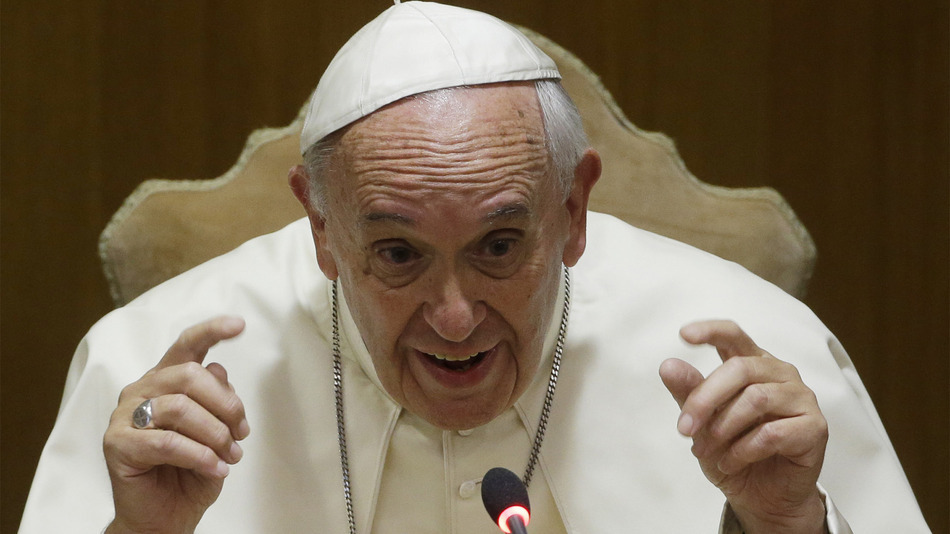Pope Francis joined a Vatican gathering of at least 50 mayors from around the world on Tuesday, signing a declaration that states the upcoming climate summit in Paris will likely be the last chance to limit global warming. The mayors, which include New York Mayor Bill de Blasio, Boston Mayor Martin J. Walsh and Rio de Janeiro Mayor Eduardo Paes, detailed the actions they have been taking in their communities to promote sustainable development and limit poverty.
Pope Francis joined the meeting for about a half an hour on Tuesday afternoon, local time, telling the audience that protecting the environment is an issue of human responsibility. His comments echoed his writing in the landmark Encyclical on the environment, known as "Laudato Si," which was released on June 18.
He also detailed his specific thoughts on the upcoming round of U.N. climate negotiations in Paris in early December. This is viewed as a crucial meeting, where negotiators are tasked with devising a new climate agreement that would go into effect in 2020.
The mayoral meeting, which also featured one governor — Jerry Brown of California — demonstrates the Vatican's continued engagement on global warming as the world approaches the Paris talks, which begin on November 30.
“I have a great hope in the Paris summit in November, I really do hope that a fundamental basic agreement is reached," Pope Francis said. "I have great hopes in that. The United Nations really needs to take a very strong position on this, particularly the human trafficking of people” [related to environmental degradation], he said.
The Pope said that mayors are key players in implementing climate and other policies.
“Individual countries may be able to make nice speeches at the United Nations but if the work doesn’t come from the periphery to the center there is no effect, and that is the responsibility of you mayors of cities,” he said.
Mayoral Declaration
The declaration signed by the mayors and other attendees calls upon world leaders to negotiate a strong climate agreement in Paris. It was written under the auspices of the Pontifical Academy of Sciences and Pontifical Academy of Social Sciences, which provide the Pope with science advice.
“Human-induced climate change is a scientific reality, and its effective control is a moral imperative for humanity,” the declaration states.
The declaration reflects the scientific consensus on climate change, which holds that meeting the agreed upon global warming target of 2 degrees Celsius, or 3.6 degrees Fahrenheit, above preindustrial levels will be extremely difficult given current emissions trends. It says that Paris is the last chance the world has to meet that goal, above which world leaders and scientists say that more calamitous climate impacts, such as many feet of sea level rise and devastating droughts and floods, become more likely.
“The world should take note that the climate summit in Paris later this year (COP21) may be the last effective oppoortuniy to negotiate arrangements that keep human-induced warming below 2 degrees Celsius, and aim to stay well below 2 deg C for safety, yet the current trajectory may well reach a devastating 4 degrees Celsius or higher," the Declaration says.
The declaration continues:
Political leaders of all UN member states have a special responsibility to agree at COP21 to a bold climate agreement that confines global warming to a limit safe for humanity, while protecting the poor and the vulnerable from ongoing climate change that gravely endangers their lives. The high-income countries should help to finance the costs of climate change mitigation in low income countries as the high-income countries have promised to do.
The declaration adds to the political momentum for climate action during the run-up to Paris. The Pope himself will continue to advocate for world leaders to agree on a more sustainable development pathway, with dramatically lower greenhouse gas emissions.
The Pope stands apart from other advocates that are trying to rally the world to turn onto a global warming offramp, from President Obama to U.N. Secretary General Ban Ki-moon, because he alone is appealing to moral, ethical and spiritual justifications for climate action. The Encyclical, in particular, reframed the climate challenge in ways that had never been done before.
At the mayoral meeting, Pope Francis echoed many of the themes he explored in the environmental manifesto.
“Taking care of the environment means an attitude of human ecology, so we can’t say that the person is here and the creation the environment is over there," Pope Francis said. "The ecology is something total, it is something human.”
“We cannot separate man from everything else," he said.
He said cities have grown in unsustainable ways, with an urban core surrounded by widening belts of poverty and shantytown slums.
“One of the things which we notice most, when there is not care for the environment and creation, is the uncurtailed growth of cities, the uncontrolled growth of cities,” Pope Francis said. “The cities grow but there are belts of poverty around them which grow wider.”
Pope Francis also discussed the problems of unemployment and migration, particularly human trafficking, which has taken on new importance this year as tens of thousands of migrants have attempted to make a perilous journey from Africa to Europe, many perishing during the voyage.
“There is a lot of unemployment and unemployment means that new people have to seek new horizons by emigrating.”
The mayoral meeting at the Vatican will continue on Wednesday, when the theme will be: “Prosperity, People and Planet: Achieving Sustainable Development in Our Cities.”
Fuente: mashable.com
